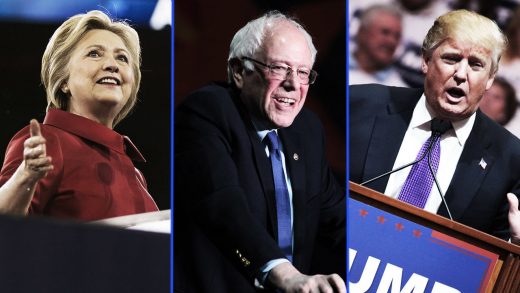Where The 2016 Candidates Stand On Key Tech Issues
As the general election draws closer, hopefully more of us will begin looking closely at the candidates’ policy positions that could become law after next January.
Several very important tech issues, including broadband access, net neutrality, and media conglomeration, are on the table this time around.
We’ll look at the positions on those issues expressed by the likely party nominees Hillary Clinton and Donald Trump, as well as Bernie Sanders, who remains in the race and continues to shape the discussion on the Democratic side.
Relationship With Silicon Valley
Hillary Clinton is said to have the support of Silicon Valley luminaries—people like Oracle’s Larry Ellison, Facebook’s Sheryl Sandberg, Box CEO Aaron Levie, venture capitalist John Doerr, and Tesla CEO Elon Musk. She’s held numerous fundraising events in the Valley during the campaign. But overall, the Valley’s big donors—the ones who gave megabucks to Obama—have reportedly yet to commit to the Clinton cause. During the campaign and several visits to the Valley, Clinton has called on the tech industry to help the government carry out essential tasks, such as fighting terror groups.
Bernie Sanders is very likely edging out Clinton in the number of individual contributions from the Valley. As recently as February, Sanders had raised more funds here than Clinton. As one report put it, Clinton may be more popular among big donors, but Sanders has won the support of more “rank and file” tech workers. This is impressive because Sanders has made far fewer trips to Silicon Valley during the campaign than Clinton. Like Clinton, Sanders has said the tech sector should work with the government to find a “middle ground” between the need for personal data privacy and national security interests.
Donald Trump has expressed little more than contempt for the Valley. He lashed out at Apple for refusing to help the FBI recover data from the iPhone used by San Bernardino shooter Syed Farook. “To think that Apple won’t allow us to get into her cellphone? Who do they think they are?” he said during a February interview on Fox and Friends. Trump has also criticized Apple for manufacturing its products overseas (like most of the rest of the tech industry), saying he’s “gonna get Apple to start building their darn computers and things in this country.”
The celebrity candidate criticized Facebook CEO Mark Zuckerberg for hiring too many foreign engineers with H-1B visas. Trump also called Amazon CEO Jeff Bezos “a scammer.”
Network Neutrality
The FCC proposed rules last year that would classify broadband as a public utility and thus give the government more power to ensure a neutral web. But the proposed rules have not been fully implemented and still face strong opposition from large ISPs.
Hillary Clinton supported the new rules, and has said she wants to make sure that the FCC has the legal power to punish large companies that violate them. She wrote in a recent Quartz op-ed: “Closing these loopholes and protecting other standards of free and fair competition—like enforcing strong net neutrality rules and preempting state laws that unfairly protect incumbent businesses—will keep more money in consumers’ wallets, enable startups to challenge the status quo, and allow small businesses to thrive.”
Bernie Sanders has been one of the fiercest critics of what he calls the anti-competitive practices of Comcast and Verizon, and he has expressed strong criticism of Internet “fast lanes.” The senator called for the Title II classification of broadband well before the FCC announced its new rules. In fact, Sanders introduced bills in 2006, 2007, and 2015 that would prevent the creation of Internet fast lanes.
Donald Trump hasn’t made any public statements suggesting he correctly understands the concept of network neutrality. Republicans tend to be against increased regulation of any kind, but Trump’s stated reason for opposing new net neutrality rules is that he fears they would lead to the censorship of conservative media. Of course, net neutrality concerns the equal carriage of data packets over the web, not the content of the data packets.
Broadband Access And Pricing
Wired broadband of 4 megabits per second (mbps) speeds or faster is still not available to 16 million Americans.
Hillary Clinton proposed in her policy platform a $275 billion investment in infrastructure. An unspecified amount of that is an investment in broadband infrastructure. The platform also includes a promise to connect 100% of American households to affordable broadband by 2020. Clinton says on her website that she’ll focus on increasing access to high-speed broadband so that “rural small businesses can better connect to the global economy, farmers and ranchers can benefit from agricultural technology, and students can benefit from distance learning.”
Bernie Sanders has publicly expressed concern about the lack of broadband access by the rural and poor. Sanders’s $1 trillion infrastructure plan includes a $5 billion investment in broadband infrastructure. Sanders has said repeatedly, in various contexts, that he believes broadband is a basic infrastructure service, like roads or schools, and should be treated as such in funding debates.
Donald Trump has said the U.S. needs new infrastructure spending, but he’s never hinted at how much a Trump administration would propose spending on broadband infrastructure.
Media Conglomeration
Hillary Clinton’s position on media consolidation is a mixed bag. She sponsored a bill in 2008 that weakened a 2008 decision to loosen regulations over ownership of newspapers and TV stations by single conglomerates in the top 20 markets in the U.S. However, it was Bill Clinton’s Telecommunications Act of 1996 that paved the way for today’s media landscape, in which 90% of the media is owned by just six companies: Viacom, News Corporation, Comcast, CBS, Time Warner, and Disney. That’s down from 50 major media companies in 1983. It’s also true that the media companies have contributed far more to Hillary’s campaign than to the other candidates.
Bernie Sanders was one of just a handful of people in Congress who voted against the Telecommunications Act of 1996. The senator has consistently spoken out against further consolidation, and has been vocal about the lack of fairness in news media owned by large corporate entities.
“In my view, it is very dangerous for our country when a single company is able to own a local newspaper, television station, and radio station in many communities around America,” Sanders says in a statement at his Senate webpage. “Opposing points of view aren’t heard and our democracy suffers.”
Donald Trump has expressed a truckload of contempt for the media, and the media can’t take its eyes off him. Who knows where Trump stands on conglomeration? There’s no position available at the candidate’s website, and we could find no public statements directly addressing the issue. Trump may have benefited from a highly consolidated media landscape, because mainstream news outlets, with an eye on ratings, have tended to focus their coverage during this election cycle on sensational, lowest-common-denominator people and events.
Internet Sales Tax
At least 12 states are now considering requiring Internet retailers to collect sales tax, according to a Wall Street Journal report. Alabama has already begun requiring it.
Hillary Clinton has said she favors “experimenting” with an Internet sales tax, but supports it only at the state and local levels. allowing cities and states to tax online purchases, but she would not mandate it.
Bernie Sanders voted in favor of The Marketplace Fairness Act of 2013, which sought to allow states to collect sales tax from Internet companies. Sanders saw the bill as a way of leveling the playing field between brick-and-mortar businesses, which must collect tax, and large Internet companies, which often have a price advantage because they’re not required to collect sales tax.
Donald Trump has made no public statements on the issue of an Internet sales tax.
A Free-Speech Internet
Hillary Clinton favors censoring the speech of terror groups online. She said during a speech to the Brookings Institution on Israel that the U.S. and its allies should work to shut down online accounts of terrorists. Her words:
“Resolve means depriving jihadists of virtual territory just as we work to deprive them of actual territory. They are using websites, social media, chat rooms, and other platforms to celebrate beheadings, recruit future terrorists, and call for attacks. We should work with host companies to shut them down.”
Bernie Sanders has resisted Internet censorship in various forms. He voted against the failed PIPA anti-piracy bill, which was pushed hard by the Hollywood lobby but ultimately failed back in 2012. PIPA, or the Protect IP Act, critics said, would have created a “blacklist” of piracy websites that could be shut down. His words:
“It is absolutely essential that the Internet remain open and free of censorship or the chilling effects that result in self-censorship.”
Donald Trump is not concerned with any “chilling effects” resulting from censoring the communications of terror groups on the Internet. He’d like tech companies to help in the censorship. His words:
“We have to go see Bill Gates and a lot of different people that really understand what’s happening. We have to talk to them, maybe in certain areas, closing that internet up in some ways. Somebody will say, ‘Oh freedom of speech, freedom of speech.’ These are foolish people. We have a lot of foolish people. We have a lot foolish people.”
Tech issues aren’t normally the focus of debate in presidential elections, but year by year they become more mainstream. Twenty years from now, the key issues in the election may include cyberterror, genomic rights, and moon colonization.
Fast Company , Read Full Story
(47)














